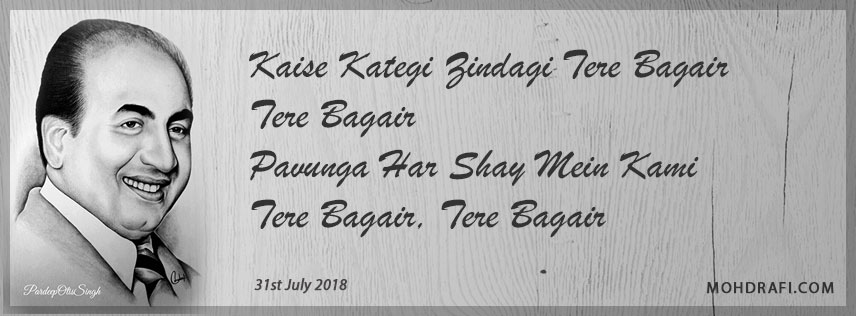He was the unparalleled king of melody
This article is written by M.L. Dhawan
Mohammed Rafi was born on December 24, 1924, at Kotla Sultan Singh village in Punjab, now in Pakistan. He moved to Lahore at the age of 14 to learn music under Khan Abdul Wajeed Khan, Jeevanlal Matto and Gulshan Ali Khan. His parents did not approve of his vocation as they felt that singing was a Mirasiyon ka pesha that would be a blot on the Chaudhry khandaan.
Rafi’s debut as a singer was in a Punjabi film Gul baloch in 1944 with
the music director Shyam Sunder. His real mentor in music was Naushad who gave him his break when he arrived in Bombay, in Pehle aap in 1944. Naushad recalls A skimpy little boy in a white shirt came to see me with a reference from some one I knew. A little nervous, he confided that his greatest ambition was to sing with Kundan Lal Saigal. Naushad fulfilled that dream of Rafi. He got him to sing two evocative lines with Saigal: Ruhi Ruhi mere sapnon ki rani for Shahjehan.
Rafi acted in Laila Majnu (1945) and Jugnu (1947), but was hardly noticed as he appeared briefly in group scenes in both the films. A mischievous rumour caught on that Rafi was a pockmarked, ugly man. Music lovers took little notice of the second stringer after Mukesh and Talat Mahmood in Mela and Babul. Rafi made his presence felt with Tera khilona toota balak in Anmol Ghari. However, he became a force to reckon with in Sajan after a fantastic duet with Noor Jehan Yahan badla wafa ka bewafai ke siwa kya hai. It was Naushad who honed his talents with Meri kahani bhoolne wale tera jahan aabad rahey (Deedar) and Yahee arman lekar aaj apne ghar se hum nikley (Shabab). With awe, music lovers listened to O duniyan ke rakhwale, sun dard bhare mere naley and Man tarpat Hari darshan ko aaj (Baiju Bawra).
Rafi’s voice was truly for the masses. Whether singing about philosophy of life in Main ne chand aur sitaron ki tammana ki thi mujh ko raton ki sihayee ke siwa kuchh na mila or imploring the beloved to hear the call of the heart in Yoon to hum ne lakh haseen dekhey hain tum sa nahin dekha or exhorting the nation with Suno suno ai duniyan walo Bapu ki ye amar kahani Rafi’s voice conveyed an extra-special flavour of pouring emotions in a simple, lucid and straightfarward style. As a singer, he was a class apart.
At one point of time in the 60s, the soft-spoken Rafi was the permanent voice of Dilip, Dev, Rajendra, Shammi, Sunil, Joy, Biswajeet, Dharmendra, Shashi, Raj Kumar, Pardeep Kumar and Bharat Bhushan. Rafi ‘s vocal virtuosity could easily juggle a Badi der bhai kab lo gey khabar morey Ram with an Aaja aaja main hoon pyar tera, an awesome range which was as wide as the Himalayas. Rafi took upon himself the responsibility to render each song differently to ensure that no single artiste from Dilip Kumar to Johney Walker, he lent his voice to, sounded like the other. For this purpose he resorted to vocal pyrotechnics. He was no composer’s favourite, yet for certain types of songs all the leading composers had no choice but to summon him to the recording room.
During his 40 years’ stay in the Hindi film industry, he sang over 26,000 songs in all the national languages. He was at home in singing the ghazal, geet, qawwali and bhajan. Whenever one of these songs wafts through the air, it evokes a nostalgia for those glorious days of Hindi film music when melody was the queen and Rafi an uncrowned King. Rafi will live for ever because of the rich heritage of songs he has left behind. Rafi was a saint singer who would never ask what he was going to be paid for a song. It is characteristic of his generosity that he sang for Nissar Kaazmi Chanda ka dil toot gaya roney lagey sitare in Khoj just for rupee one. Sometimes he did not accept even this much.
Shahid Rafi recalls a traumatic phase in the life of his father. After a Haj pilgrimage, Rafi was told by some one that singing was a sin — an un-Islamic act. Rafi went to London to stay with his sons. During his absence a lethal combination of Rajesh Khanna and Kishore Kumar dethroned all the leading male singers like Talat Mahmood, Mukesh, Manna Dey and Mohammed Rafi. Rafi was no quitter. On his return he made a triumphant comeback with Barbad-e-mohabbat ki dua saath liye ja, main tere dar pey aaya hoon, yeh diwane ki zid hai apney diwane ki khatir aa, Likh kar tera nam zamin par tujh ko sajde karta hai, for Rawail films’ Laila Majnu under the baton of Madan Mohan. Rafi was once again on the top by dint of that one vital quality — the motivation to excel, that desire to do better than his colleagues. On July 31, 1980, a massive heart attack silenced the peerless singer forever leaving the music lovers stunned and shocked.
Now there are any number of Rafi clones. A clone is always a clone. Many may sing like him but there just cannot be another Rafi. Scores of imitators are around but no singer can replicate Rafi.
– M.L. Dhawan















Great article. I am just sad I dont know how to reply properly, though, since I want to show my appreciation like many other.